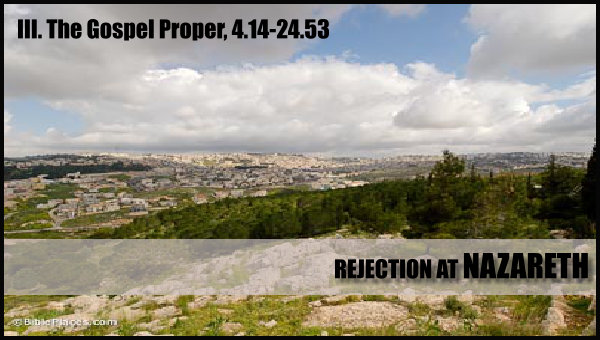By Tyson Thorne

The Galilean Ministry at Nazareth, 4.14-30
After completing his introduction to, and proof of, the Messiah being the rightful king of all humanity Luke turns to the gospel proper. This section begins with a “progress report” of sorts (Luke 4.14-15). We see throughout the book of Acts a series of progress reports on the growth of the early church. These reports are marked divisions of the text that can be used to break down the content and outline the book. Luke also includes progress reports in his gospel, but rather than being about the church they are about how people respond to Jesus. Unlike his use of these reports in Acts, there is no discernable indication that they are used as division markers in the Gospel. Even so, they are worth calling out. With Jesus now ready for ministry and the people in awe of him he is prepared for his first big let-down: Nazareth.
Jesus returns to his home town and is allowed to speak in the synagogue. Some archeologists believe that Mary’s grandfather was a member of the Qumran community known as the Essenes. This society lived in the wilderness and dutifully copied what we refer to as the Old Testament. It is speculated that Jesus may have spent time with the Essenes as well which may help explain how he was so familiar with the Scriptures by the age of 12. While wildly speculative, one can imagine that the scroll Jesus read from on this occasion was one he had written himself years before.
The passage Jesus chose to read that day was about the Messiah and his mission. By proclaiming that the prophecy had been fulfilled even while he was reading it he was claiming to be the Messiah. After his lesson was over the people, like so many of today’s congregants, told him he had delivered a fine sermon. That’s when the “prophet principle” kicked in. I’ve coined the phrase “prophet principle” as a name for the notion that “a prophet has no honor in his home town.” It goes beyond that, however, as we all find that we are least respected by those who know us best. We’ve all experienced this doubt. Often when we try to make a real change in our lives it is our friends and family who, through disbelief, drag us back into our old way of life. It was no different for Jesus. His neighbors could bear Jesus being a Rabbi, but not the Messiah.
As a side note, we know from John 2.4 that Jesus was aware of a timeline no one else knew about. When his mother asks him to perform his first miracle (turning water into wine) he tells her, “Woman, why are you saying this to me? My time has not yet come.” Apparently in this moment his time had come, because he reveals himself for who he is, God’s Messiah and the savior of the world.
The people were initially enraptured by Jesus’ sermon, but if he was the Messiah (as he claimed to be) then he needed to prove it. This is why Jesus quotes the proverb “Physician heal yourself!” Similar sentiments were proclaimed during his beatings just prior to his crucifixion. Jesus had a hood pulled over his head and a soldier would beat him and then ask, “Who hit you?” The meaning of both of these incidents is “prove to us you are the Messiah of God.” Yet Jesus wasn’t there to deliver proof of his claims, rather he was seeking the people’s faith; Neither Jesus nor his neighbors received what they wanted.
As Jesus was unwilling to perform a miracle for them, they concluded he was a blasphemer and attempted to kill him. Somehow, as we see Jesus doing on other occasions, he was able to slip through them and continued on his mission. The English translation of this miracle is understated and reads in most translations something like “[Jesus] passed through the crowd” or “through their midst” and “went on his way.” But this last phrase is more meaningful than simply packing up and leaving, it suggests that Jesus continued in a divine direction, or was led by a divine person. This helps us make sense of how he was able to escape the mob and indicates that Jesus was indeed on a journey, a theme Luke develops more completely in chapter nine.
|
|
